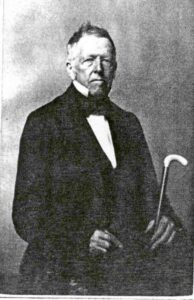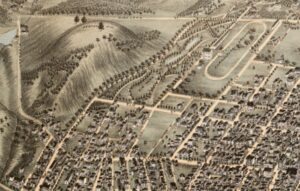

Rejoice Newton was a prominent figure in pre-Civil War Worcester. He and his wife Rebecca Lincoln were owners of a large estate on the west side of Worcester, with a farmstead near here on the Pleasant Street side of Newton Hill.
Park Ave was originally Newton Street, his farmhouse, and barn near the contemporary Newton Square, and a mill he operated located at Beaver Brook. An attorney in practice with his brother-in-law William Lincoln, Newton had been Worcester County District Attorney, state representative and state senator, active at the American Antiquarian Society and longtime moderator of the First Unitarian Church. He also sold land, not far from this location, for the first Catholic burial ground at Worcester. Newton occupied a primary residence at the corner of Main and State Streets on Court House Hill.

The property was inherited by his daughter Hester, wife of Attorney John W. Wetherell, along with her father’s substantial real estate holdings. Isaac Mason, (1822-1898) who was born in Kent County, Maryland, was a fugitive slave. He lived in several places before 1850 when an Anti-Slavery Society agent at Boston sent him to Worcester. In 1893, he published his autobiography, Life of Isaac Mason as a Slave, explaining that when he arrived in Worcester found employment as a farmhand for Rejoice Newton near this location.
Carte de visite: American Antiquarian Society
Newton farm: Worcester Historical Museum